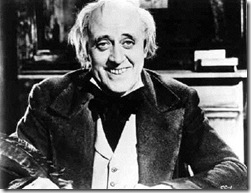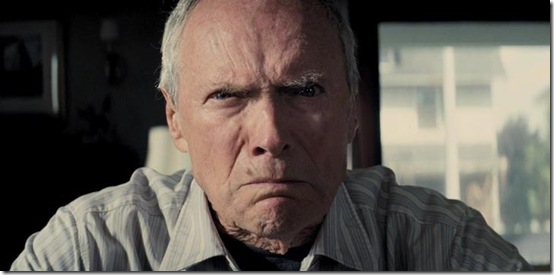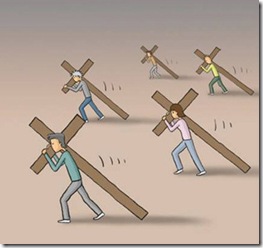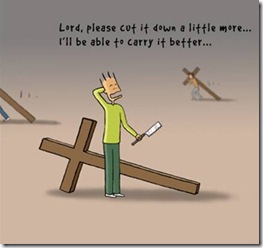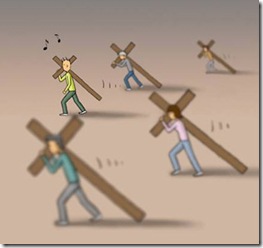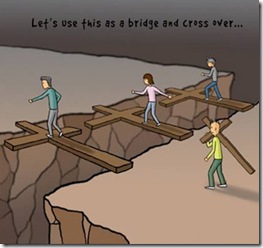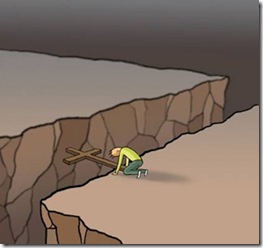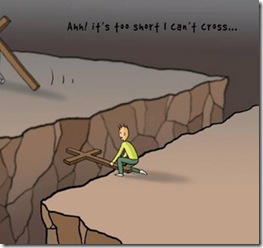“Didn’t I tell you,” answered Mr. Beaver, “that she’d made it always winter and never Christmas? Didn’t I tell you? Well, just come and see!”
And then they were all at the top and did see.
It was a sledge, and it was reindeer with bells on their harness. But they were far bigger than the Witch’s reindeer, and they were not white but brown. And on the sledge sat a person whom everyone knew the moment they set eyes on him. He was a huge man in a bright red robe (bright as holly-berries) with a hood that had fur inside it and a great white beard that fell like a foamy waterfall over his chest. Everyone knew him because, though you see people of his sort only in Narnia, you see pictures of them and hear them talked about even in our world—the world on this side of the wardrobe door.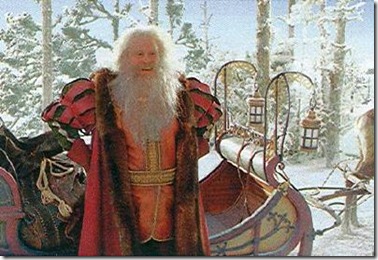 But when you really see them in Narnia it is rather different. Some of the pictures of Father Christmas in our world make him look only funny and jolly. But now that the children actually stood looking at him they didn’t find it quite like that. He was so big, and so glad, and so real, that they all became quite still. They felt very glad, but also solemn.
But when you really see them in Narnia it is rather different. Some of the pictures of Father Christmas in our world make him look only funny and jolly. But now that the children actually stood looking at him they didn’t find it quite like that. He was so big, and so glad, and so real, that they all became quite still. They felt very glad, but also solemn.
“I’ve come at last,” said he. “She has kept me out for a long time, but I have got in at last. Aslan is on the move. The Witch’s magic is weakening.”
And Lucy felt running through her that deep shiver of gladness which you only get if you are being solemn and still.
“And now,” said Father Christmas, “for your presents. There is a new and better sewing machine for you, Mrs. Beaver. I will drop it in your house as I pass.”
“If you please, sir,” said Mrs. Beaver, making a curtsey. “It’s locked up.”
“Locks and bolts make no difference to me,” said Father Christmas. “And as for you, Mr. Beaver, when you get home you will find your dam finished and mended and all the leaks stopped and a new sluice gate fitted.”
Mr. Beaver was so pleased that he opened his mouth very wide and then found he couldn’t say anything at all.  “Peter, Adam’s Son,” said Father Christmas.
“Peter, Adam’s Son,” said Father Christmas.
“Here, Sir,” said Peter.
“These are your presents,” was the answer, “and they are tools not toys. The time to use them is perhaps near at hand. Bear them well.” With these words he handed to Peter a shield and a sword. The shield was the colour of silver and across it there ramped a red lion, as bright as a ripe strawberry at the moment when you pick it. The hilt of the sword was of gold and it had a sheath and a sword belt and everything it needed, and it was just the right size and weight for Peter to use. Peter was silent and solemn as he received these gifts for he felt they were a very serious kind of present.
“Susan, Eve’s Daughter,” said Father Christmas. “These are for you,” and he handed her a bow and a quiver full of arrows and a little ivory horn. “You must use the bow only in great need,” he said, “for I do not mean you to fight in the battle. It does not easily miss. And when you put this horn to your lips and blow it, then, wherever you are, I think help of some kind will come to you.”
“You must use the bow only in great need,” he said, “for I do not mean you to fight in the battle. It does not easily miss. And when you put this horn to your lips and blow it, then, wherever you are, I think help of some kind will come to you.”
Last of all he said, “Lucy, Eve’s Daughter,” and Lucy came forward. He gave her a little bottle of what looked like glass (but people said afterwards that it was made of diamond) and a small dagger. “In this bottle,” he said, “there is a cordial made of the juice of one of the fire-flowers that grow in the mountains of the sun. If you or any of your friends are hurt, a few drops of this will restore you. And the dagger is to defend yourself at great need.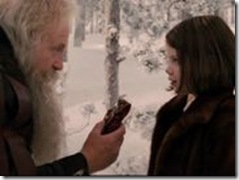 For you also are not to be in the battle.”
For you also are not to be in the battle.”
“Why, Sir,” said Lucy. “I think—I don’t know—but I think I could be brave enough.”
“That is not the point,” he said. “But battles are ugly when women fight. And now”—here he suddenly looked less grave—”here is something for the moment for you all!” and he brought out (I suppose from the big bag at his back, hut nobody quite saw him do it) a large tray containing five cups and saucers, a bowl of lump sugar, a jug of cream, and a great big teapot all sizzling and piping hot. Then he cried out “A Merry Christmas! Long live the true King!” and cracked his whip and he and the reindeer and the sledge and all were out of sight before anyone realised that they had started.
C.S. Lewis, The Lion, The Witch and The Wardrobe, Chapter X: The Spell Begins to Break.
